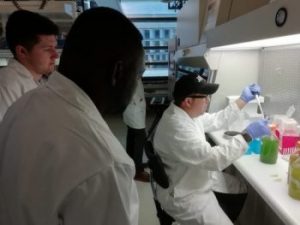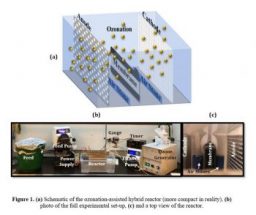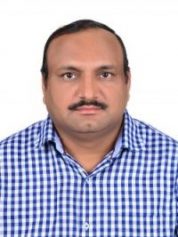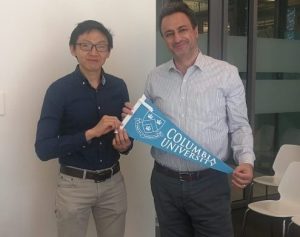
Prof. Hector H. Hernandez conducted two research visits to Northumbria University to establish a research collaboration and the Academic Development Centre on new generation biofuels for future clean energy and transport. The proposed research will explore and test the technical potential of production and application of new generation of biofuels and its environmental aspects for future clean transport. New findings from this project will help to address global challenges and achieve targets set for future clean fuels and internal combustion engines. This network will facilitate research workshops and seminars and attract academics, businesses and local government organizations to advance in biofuel development and commercialization (Newcastle, UK, 3-10 November 2018 and 26-6 March 2019.

Ceramic membranes offers several advantages over the polymeric membranes. Ceramic membranes have a narrow pore size distribution, are resistant to aggressive chemicals, high temperatures and provide a comparatively longer service life. Prof. Shadi Hasan has established a collaboration with a ceramic membrane international company (CERAFILTEC) which will help in supplying the ceramic membranes as well as being a potential collaborator seeking an externally funded project in the field of wastewater treatment using ceramic membranes.
Prof. Hassan Arafat conducted a research visit to Wageningen University and TNO, Netherlands. This visit follows a visit by the Netherlands Embassy in UAE to CMAT, where they expressed interest in fostering a research collaboration between CMAT and Dutch applied research universities and industry with innovative water and agriculture technologies, on the other. The embassy offered to facilitate the communication with Dutch universities and companies and provide a seed funding to cover the engagement of the Dutch parties. The goal of this collaboration is to demonstrate the coupling of novel desalination/water treatment technologies (developed by CMAT members and/or Dutch researchers) with state-of-the-art horticulture in order to provide solutions for water and food securities in the UAE. Based on a screening of several Dutch universities, Wageningen University & Research (WUR) was identified as the most likely academic partner. WUR is a world-class agricultural research university, but in recent years, they also took over the management of several water research organizations, like TNO, which pioneered research on innovative desalination technologies such as membrane distillation. (The Netherlands, 9-15 Jun 2019).

Ms. Hanaa Baniowda, from An-Najah National University, Palestine spent the summer assisting CMAT Research Scientist, Dr. Mahendra Kumar for a three-month internship. The collaboration and internship opportunity has produced high-quality research that is currently being considered in a high-impact factor journal. During the internship, she was trained on membrane fabrication, nanomaterial synthesis and material characterization.
The world constantly confronts an intensified problem of water scarcity, partly due to contamination of many existing freshwater sources. Membrane-based separation processes such as ultrafiltration (UF) are instrumental in handling polluted surface water from different sources, and producing good quality drinking water.
Nonetheless, membrane processes used in such applications suffer from fouling issues, caused by compounds such as natural organic matter (NOM) in water. In this research, high performance hybrid UF membranes with charge tunable channels were fabricated. The hybrid membranes were synthesized with functionalized polymer chains grafted on graphene oxide nanosheets. These membranes were observed to exhibit superior flux, fouling resistance and NOM retention performance. This research would potentially pave way for the development of other types of functionalized polymer chains grafted nanofillers for membrane fabrication.

A one-day international workshop titled “Advances in Membrane Science and Water Technologies Supporting Sustainable Water Supply” was conducted on March 18, 2019 and included lectures by the advisory board members of CMAT. The workshop was attended by KU faculty and students, members of UAE industry and public utilities sectors and visitors from other countries.
Dr. Giovanni Palmisano organized a seminar titled “Design of Titania Supported Systems for Photocatalytic Air and Water Cleaning”, by Dr. Natasa Novak Tusar, Group Leader for Catalysis – Design and Development of Porous Catalysts for Environmental and Energy Technologies, Department for Inorganic Chemistry and Technology, National Institute of Chemistry, Ljubljana (11 Apr 2019). Furthermore, he also organized a workshop titled “Photocatalysis – Advances in Water and Environmental Remediation” and two seminars on Photocatalysis by Dr. Albin Pintar and Dr. Gregor Zerjav, Researchers at the National Institute of Chemistry, Ljubljana, Slovenia. Dr. Hector H. Hernandez hosted a visit from Dr. Ulugbek Azimov and Dr. Jose Munoz along with two students from Northumbria University (3-10 March 2019).
Dr. Hector H. Hernandez organized an afternoon research workshop on the potential for collaboration between Northumbria University and Khalifa University on next generation biobased fuels. Faculty from both Northumbria University and Khalifa University presented their research with the day ending in a round table discussion on opportunities for collaboration efforts (5 March 2019).
Prof. Ngai Yip, from Columbia Univ. (USA), was hosted for a 7-day research visit by CMAT under a US National Academy of Science Arab American Frontiers Research Fellowship. During his visit, he conducted a workshop titled “Fundamentals and Recent Advances in Membrane distillation” (Apr 2019).
Sustainable mechanical pressure converter for water desalination that has been designed and fabricated in KU was presented as a promising sustainable desalination system at 2018 Global Grad Show in Dubai Design Week.
Eighty percent of the water consumed in the UAE is generated by water desalination facilities. The current seawater desalination technologies are both expensive and energy intensive. The sustainable mechanical pressure converter developed by the KU students provides an innovative and sustainable alternative for seawater desalination. The mechanical pressure converter reduces the need for power or fossil fuels by utilizing a hydraulic device that transforms wind energy into the pressure required by membrane desalination to generate fresh water. The project was well-aligned with UAE’s long term goals related to water scarcity, energy consumption and sustainability in the country.